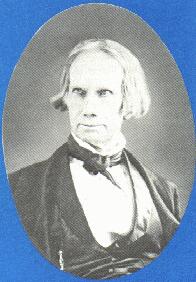
Henry Clay (1777-1852)
(see relationship at end of story)

Henry Clay (1777-1852)
(see relationship at end of story)
| A United States statesman. His genius for compromise
won him the titles of "the Great Pacifier" and
"the Great Compromiser" in the era proceeding
the Civil War. He was also a master parliamentarian and
an eloquent orator. Clay was an unsuccessful candidate
for President three times. Later he remarked, "I
would rather be right than President!" Clay was
secretary of state under President John Quincy Adams.
Twice he sat in the Kentucky legislature, the second time
as its speaker. He served 11 years in the U.S. House of
Representatives, most of the time as speaker, and 16
years in the U.S. Senate. In politics, Clay was a spokesman for the border state Kentucky and the middle-of-the-road Whig party. He sought to reconcile differences between the North and South on slavery. Clay also represented the nationalist outlook of the young, expanding Middle West. In support of the region’s territorial interests, he boldly urged war with Britain in 1812. Through his "American System" political platform, which called for protective tariffs for eastern manufacturers, federally finance internal improvements for the West, and a national bank, he sought to link the industrial east with the agrarian west. Early Career Clay was born in Hanover County, Virginia. His father, a Baptist minister, died when Henry was barely four. Clay had little formal education but was able to study law under one of Virginia’s most famous lawyers, George Wythe. At the age of 20, Clay was admitted to the bar. Soon after he moved to Kentucky. He became a successful criminal lawyer, and his reputation grew. In 1803 he was elected to the Kentucky legislature representing a district near Lexington, where he lived on a plantation called Ashland. He served from 1803 to 1806 and from 1807 to 1809. During 1806-7 and 1810-11, he filled out terms of two deceased Kentuckians in the U.S. Senate. Clay was elected to the U.S. House of Representatives in 1810 and soon was chosen its speaker. As the leader of the aggressive, midwestern "War Hawks," Clay helped push President Madison into war with Great Britain in 1812. In 1814, Clay resigned from Congress after Madison chose him to be one of the American delegates to the peace conference. During this period Clay developed hostility toward Andrew Jackson, whom he viewed as a dangerous political rival and who he felt had slurred the honor of Kentucky troops by accusing them of cowardice at the Battle of New Orleans. Clay was reelected to the House in 1815 and was again chosen speaker. In 1820 Clay’s talents as a compromiser where first demonstrated when he played a leading role in steering the Missouri Compromise through Congress. This law reduced tension between the North and the South over slavery. Political Battles Clay returned to Kentucky in 1821, remaining there for two years. He was reelected to Congress in 1823 and again became speaker. In 1824 he ran for President and finished fourth. No candidate received a majority in the Electoral College, however, so the House of Representatives chose from the top three. Clay threw his support to John Quincy Adams, the second-highest man, who thereby won over Jackson, the original leader. Clay became Adam’s secretary of state. Since Adams represented eastern financial interests, who views were opposed to those of Clay’s midwesterners, Clay was accused of having made a traitorous deal. While secretary of state (1825-1829), Clay was a strong advocate of Pan-Americanism, the movement to foster cooperation among nations of the Western Hemisphere. Jackson defeated Adams for Presidency in 1828, an in 1832 defeated Clay, who thus lost his second bid for the high office. In the meantime, Clay had been reelected to the Senate, in 1831. "The Great Compromiser" In 1832 the South Carolina legislature voted to nullify a federal high tariff law originally sponsored by Clay. The state threatened to secede if President Jackson carried out his threat to enforce the law. Early in 1833 Clay piloted through Congress a compromise tariff act that smoothed over the crisis (Nullification). Clay resigned from the Senate in 1842, deeply disappointed over the failure of President John Tyler, a Whig, to support his legislative program. In 1844, however, Clay received the Whig nomination for President. He was narrowly defeated by Democrat James K. Polk. The campaign issue was the annexation of Texas as a slave state. Clay took an ambiguous stand and thereby lost vital support from both slavery and anti-slavery factions. Clay was returned to the Senate in 1849. Again he helped head off civil war, this time by proposing the measure that made up the Compromise of 1850. They included admitting California as a state, organizing territorial governments in lands won from Mexico, and granting the South a stringent fugitive-slave law. Speaking in the Senate, Clay pleaded for national unity. He denied that any state had the right to secede, and predicted "ferocious and bloody" civil war should it be tried. (Compromise of 1850; Fugitive Slave Laws). ©1991 New Standard Encyclopedia – Standard Education Corporation – Chicago. |
Henry Clay was my 2nd cousin, six times removed. His father, Rev. John Clay was son to John Clay, son of Henry Clay and wife Mary Mitchell; my 7th great-grandparents. The Lineage: 10th. Sir John Clay (1558-1632 Eng) m. /wife unknown/ |
![]()
Back to Main Page
www.ifreeman.com